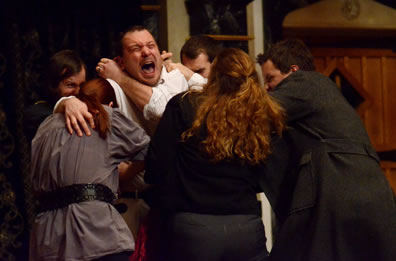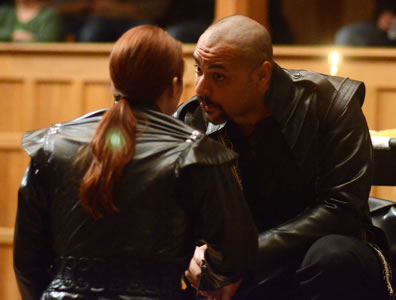Julius Caesar
Passing on the Baton of Despotism
One Republic to Another
American Shakespeare Center, Blackfriars Playhouse, Staunton, Va.
Saturday, January 12, 2013, C-6&7 (center stalls)
Actors’ Renaissance Season

Julius Caesar (Benjamin Curns) is stabbed by the conspirators:, from left, Casca (Chris Johnston), Cassius (Sarah Fallon), Cinna (Grant Davis), Decius Brutus (Allison Glenzer), and Metellus Cimber (John Harrell). Brutus awaits downstage. Photo by Pat Jarrett, American Shakespeare Center.
I saw a bumper sticker on a car recently that said, "It's not about the right and left, it's about liberty and freedom." So, was this on a Tea Partyer's car or the ride of an ultra-liberal? Because liberty and freedom is all about perspective—whether you're looking from the right or the left, whether you’re looking up or down. One man's liberty to own a semiautomatic rifle with high-capacity magazines is contrary to a little girl's freedom from fear. A young man's freedom to attain an education equal to peers in other communities runs counter to a property-owning woman's liberation from taxes. Government regulations are to this person a tyrannical obstruction to the pursuit of prosperity and to that person a necessary guarantor in the pursuit of prosperity.
One person’s Caesar is another person’s Brutus.
In the electrifying, text-centric production of Julius Caesar by the American Shakespeare Center at the Blackfriars Playhouse, we see Shakespeare tackle this dichotic conundrum of republican government. Every character acts on behalf of "Liberty! Freedom! and Enfranchisement!" but in doing so, they actually abrogate the liberty, freedom, and enfranchisement of most Romans. In the end, two despots (and, afterward only one) are left standing. Along the way, Shakespeare presents a wide spectrum of interpersonal relationships that have ramifications on the public state.
To describe Julius Caesar as “electrifying” might itself seem a conundrum to anybody who has had the typical stage or cinematic experience with this play or suffered through it in high school. But Shakespeare himself might have intended more of a potboiler than we are used to seeing, as evidenced by this production that kicks off the 2013 Actors’ Renaissance Season at the Blackfriars, in which the actors work according to the production process of Shakespeare’s original theater company, mounting the play without a director or designers on a few days of rehearsal and using only cue scripts. Typically in these productions, the actors turn even the most pedestrian of Shakespeare-era plays into a photo-finish sprint of so many Usain Bolts. Julius Caesar is no exception.
In fact, sprint is an apt term here, for the production lasts just over two hours as the players engage in Mamet-like dialogue, rat-a-tat-tatting the rhetoric that is the central theme to this play. However, rather than being a play about words, words, words, this ASC cast gives us a drama of conflicting personalities—sometimes within the same character—and a political thriller that, even though we know the outcome so well, plays with a Game of Thrones urgency.
At the center is not the titular character (played with self-absorbed ego by Benjamin Curns) or even the famous speechmaker Marc Antony (Gregory Jon Phelps stepping gingerly through the political minefield) but the interplay and innerplay of Brutus and Cassius, played respectively by René Thornton Jr. and Sarah Fallon. These two actors have now been paired a dozen times as "lovers" on the Blackfriars stage, including Benedick and Beatrice, Petruchio and Kate, Othello and Desdemona, Aaron and Tamora, and Aeneas and Dido. Pitting Fallon and Thornton opposite each other as the hot-headed Cassius and ultrahonorable Brutus is the closest ASC comes to stunt casting, and it achieves breathtaking results.
This doesn't mean the two are presented with homosexual overtones, but it does mean that, as characters in the hands of these two intelligent Shakespearean actors, theirs is a genuine friendship. Cassio displays true affection for Brutus, and Brutus regards Cassius with real respect. These feelings keep the two from killing each other in the tent argument even though Fallon's Cassius is pushed beyond frustration and Thornton's Brutus is driven beyond exasperation. This scene becomes heart-pounding theater with these two actors not only emoting Shakespeare's verses from the deepest roots of their characters' personalities but also working in the fluid rhythm that comes from their long, trusting professional relationship on the stage.
In Fallon, we see that Cassius is not just a foaming-mouthed fomenter of rebellion who manipulates Brutus into action and then proves helpless in countering the bad decisions that lead to their mutual destruction. Caesar himself says of Cassius that “he is a great observer, and he looks quite through the deeds of men.” Fallon’s Cassius sees danger in Caesar, not only for himself but also for people of such good character and repute as Brutus. On that, he acts. While he comes to consider Brutus to be honorable to a fault, he ultimately acquiesces to Brutus' decisions out of long-held admiration as well as for political necessity (Fallon’s Cassius closely watches the other conspirators reacting to Brutus' first countermand).
In Thornton, though, we see a Brutus whose code of honor becomes as dangerous as the code of self that Caesar exhibits. The difference between these two men is the width of a coin showing opposite images of ego on either side. Even as early as Act 2 Scene 1, when the conspirators meet in Brutus’ orchard, we see Brutus' own despotic nature emerge, bullying the other conspirators rather than working in consensus with them. If Brutus and Cassius had ultimately succeeded, Rome likely would have ended up with another egomaniac as omnipotent as Caesar—and a still-frustrated Cassius looking through the deeds of this Brutus and plotting yet another assassination.
Instead, Rome ends up with Antony and Octavius Caesar. The latter, played with a steely resolve and a deficit of humor by Grant Davis, is clearly the most impenetrable force among the politicians in this play. We can tell at their first meeting that Antony, despite his greater experience and reputation, is doomed in trying to share power with the young upstart.
However, Phelps' Antony is a harder character to read, and I came to appreciate this enigmatic portrayal. Definitely the party boy at the beginning, he seems ready and willing to die at the hands of the conspirators after Caesar’s assassination. When they don’t kill him, he starts pushing his own political envelope while warring with the emotions that come from having just seen his mentor and protector murdered. His “Friends, Romans, Countrymen” speech comes off as spontaneous, an oration he’s finding his way through by feel. “I am no orator, as Brutus is,” he says, and he seems to mean it. The logical progression of Shakespeare’s brilliant composition gets on track by its own accord as Antony speaks it. Yet, this may be an act. Antony, for all his playboy ways, perhaps learned image management from the ultimate master of that skill, Caesar. As the plebeians run riot after the assassins, Phelps turns to us, the audience, and says matter-of-factly, “Now let it work. Mischief, thou art afoot: take thou what course thou wilt.” These are the words of a veteran soldier who knows how to engage a battle and react to whatever course it takes.

Cassius (Sarah Fallon, left) and Brutus (René Thornton Jr) reconcile after their argument in the tent scene. These two actors have been paired as lovers in almost a dozen plays at the Blackfriars Playhouse, and though they play the relationship between the two chief Roman conspirators as one of mutual admiration and respect, their acting skills singly and in tandem turn this scene into riveting theater. Photo by Pat Jarrett, American Shakespeare Center.
Allison Glenzer, John Harrell, Daniel Kennedy, and Abbi Hawk give us an insightfully comic turn as the plebeians during Antony’s speech. Caesar’s covered body lies on a stretcher in the middle of the stage, and the plebeians maintain a respectful distance until Antony reveals the will, whereupon they step right over the body to get closer to this new object of interest. Self-interests and the politicians who manipulate them have been the ways of republics since the concept of democracy was born.
Playing that body on the stage, the second of a dominating three-phase performance, is Benjamin Curns. He makes a great Caesar’s ghost late in the play, too, but it is his performance as the living, breathing, strutting peacock of a Caesar that lingers over the play long after he’s been killed. Curns plays Caesar, in white suit and tie like a Southern politician, as a walking ego, a self-reflection of greatness. Image is all to this Caesar, even as he recovers from his epileptic seizure, and it is because he is so self-aware that he is completely unaware of how Antony has been taken aside, leaving Caesar alone and suddenly surrounded by dangerous men (and by extension, Caesar is unaware that Brutus, not Cassius whom he had suspected most, has become the most dangerous).
As Caesar rambles on about what it is to be Caesar, we see the assassins ready themselves. Watching them moving into position, watching them stealthily withdrawing their knives from their shirts and waistbands, watching them glancing at each other for cues and assurance, and watching Casca (Chris Johnston turning a minor character into an indelible part) waiting for the exactly perfect moment to strike is thriller theater at its best. We know what’s coming, but this detailed build-up gets your heart beating just a little faster, and your shoulders leaning forward in space. I think my mouth was suspended in a gape, too.
“Liberty! Freedom! Tyranny is dead!” Cinna shouts after Caesar falls. But tyranny is not dead. Et tu, Brute. Et tu.
Eric Minton
January 15, 2013
This review also appears on PlayShakespeare.com
Comment: e-mail editorial@shakespeareances.com.
Start a discussion in the Bardroom



 Find additional Shakespeareances
Find additional Shakespeareances